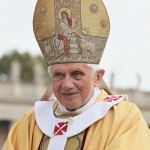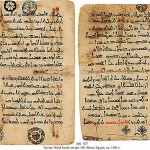My paper “The Word in Creation: The Ratzingerian Critique of the Historical-Critical Method and Its Application to the Creation Accounts” is up at Homiletic and Pastoral Review.
Two of my preoccupations during my master’s studies were Creation (particularly the Augustinian understanding of Genesis) and the theology of Pope Benedict. This paper was where the two converged thanks to Ratzinger’s little masterpiece In the Beginning…’: A Catholic Understanding of the Story of Creation and the Fall, which allowed me to explore his approach to Biblical criticism in the context of unfolding Genesis 1.
Here’s a bit of it:
Creation was not a preoccupation of the Israelites until after the Babylonian captivity, when they began looking back at their origins and—drawing on ancient tradition—developed the passages into the form we now know. What they tell the Jews is simply this: God was never just the God of one piece of land or one place. If he was, then he could be overthrown by another, stronger “god.” After Israel lost everything, and began encountering God again in their misery, they came to understand that this was the God of all people, all lands, and indeed, of all the universe. He had this power, first in Israel, then in Babylon, because he created the world and all that was in it.
In captivity, they heard creation myths such as that of the Babylonian Enuma Elish, which tells of Marduk splitting the body of a dragon in two to form the world, and fashioning humans out of dragon blood. All of this dark and primordial nonsense is banished by the image of an earth “without form and void.” No more dragons, no more gods, no more violence and blood: just the pure power of creation from nothing, by a God who made man, not to suffer and struggle and die, but to walk in paradise.
There was order to creation, not chaos. It emerged from Reason, not madness. And it was spoken into being by the Word of God. Indeed, Jews believed that the Torah existed before creation. Creation happened to make the Torah known.
Furthermore, the shape of the creation account itself was meant to echo the Torah and to sanctify time and the week. Time becomes sacred in this account, with man laboring for six days in imitation of God, and resting to worship God on the seventh, in imitation of the “rest” of God Himself. The creation accounts thus build towards, and culminate in, the Sabbath, “which is the sign of the covenant between God and humankind.”24 In a very real sense, then, the creation account can be seen as liturgical: “Creation exists for the sake of worship.” That final day is a day in which humanity itself participates in the freedom of the almighty, provided to us in the covenant. We “enter his rest” (in the words of Psalm 95 and Hebrews).












